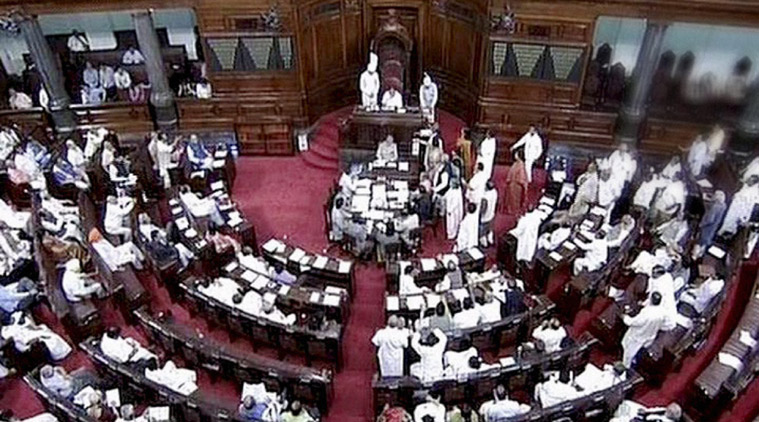Louis XVI in 1787 reminded the Parlement of Paris in vain that it was a mere registering body of royal edicts. Indian Parliament needs no such reminder, for it has, of its own free will, reduced itself to that position. In the Westminster system that we follow, the executive is a creation of the legislature. The council of ministers headed by the Prime Minister owes its existence and to the support of the majority of members of the Lok Sabha. However, over the decades the creation has come to dominate the creator to the extent of reducing it to play a second fiddle in something which is its primary duty, law making.
The issue recently attracted renewed attention when Rahul Gandhi, during his recently concluded tour of the United States, at the Princeton University, rued the fact that law makers in India do not actually make laws. He was only recounting what is undeniable truth. It is the executive that actually conceives the law and steers the law making process. The legislators simply vote for or against the proposed bill, depending upon the stance taken by their respective party high command. It is true that a few private members show some initiative in law making process. But, Indian parliament’s record in passing private member’s bill is dismal, only fourteen since independence. Legislators cannot hope to tilt the balance in favour or against a proposed law through debates. That being the case, the debates hardly serve the purpose of shedding light on the issues, they simply produce heat. No wonder the quality of parliamentary debates has deteriorated over the years.
The representative democracy that we chose has a mutated in way that the members of legislative bodies do not act as the representatives of their constituents, but that of their party bosses. Most of the M.P.s or M.L.A.s in their self image hardly visualise themselves as law makers. They see themselves as someone who has to things done for the people of their constituency. This understanding is reflected in their election campaign, which seldom includes promise to support or oppose any proposed law and in their continued demand to increase MPLAD or MLALAD fund.
Law makers take great pride in informing us that in the parliamentary committees the bills are discussed threadbare and members freely express their personal opinions on a bipartisan basis. Be that as it may, the fact remains that when it comes to voting, the legislators are constitutionally mandated to vote strictly along the party lines. This has been ensured by the 52nd constitutional amendment act, 1985 which introduced the anti defection law. The amendment added the tenth schedule to the constitution which contains provisions as to disqualification on the ground of defection. Section 2(1) (b) of the tenth schedule reads that a member shall be disqualified if he votes or abstains from voting, contrary to any direction issued by the political party.
The anti defection law has met with opposition from some quarters since the very beginning on the ground that it impinges on the right of free speech of the legislators. A PIL was filed in the Supreme Court in 1992 challenging the constitutional validity of the law. In this famous case (Kihoto Hollohon vs Zachillhu and Others) the bench headed by Justice Venkatachalliah upheld the constitutional validity of the tenth schedule. The court ruled that the law does not violate any rights of free speech or basic structure of the parliamentary democracy. However, the court in its observations on section 2(1) (b) of the tenth schedule, highlighted the need to limit disqualifications to votes crucial to the existence of the government and to matters integral to the electoral programme of the party, so as not to ‘unduly impinge’ on the freedom of speech of members.
The anti defection law has regulated parliamentary behaviour for over three decades now. The law has served its basic purpose of checking the ‘aaya ram, gaya ram’ phenomenon in Indian politics with considerable success and the ‘horse trading’ has been curbed at least in retail, though the wholesale trade still continues. The law provided stability to the governments, specially when the elections repeatedly gave fractured mandates. However, in the bargain it has also stifled the voice of individual law makers and reduced the accountability of the government to the parliament.
The phenomenon of defection is not peculiar to India. Other advanced democracies like UK, USA, Australia too face similar problems. In UK the most famous case is that of Ramsay Macdonald, the first Labour Prime Minister, in 1931. In Australia governments have often been toppled on account of defection. In the USA, Congressmen often vote against the official position of their party on important issues. However none of these countries have enacted such law to regulate their legislators.
Peculiar circumstances in India might justify the anti defection law. But, in the interest of parliamentary democracy the scope of disqualification under the law needs to be restricted. For this purpose the private member bill once introduced by former Congress M.P., Manish Tewari can serve as a model. His bill proposed to restrict the anti defection law to votes of confidence and money bills. Ideally the ruling party with huge majority in the Lok Sabha should take the lead. If not, the opposition should take the initiative on its own. Rahul Gandhi in his conversation at the Princeton expressed the desire to push forward a transformation of the Lok Sabha and the Vidhan Sabha. If he so desires, the amendment of anti defection law could be the case at hand.
Disclaimer: The opinions expressed in this article are the personal opinions of the author. The facts and opinions appearing in the article do not reflect the views of NEWSD and NEWSD does not assume any responsibility or liability for the same.


















